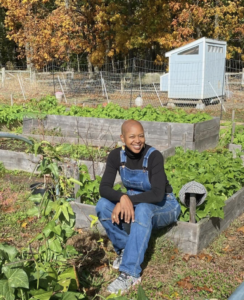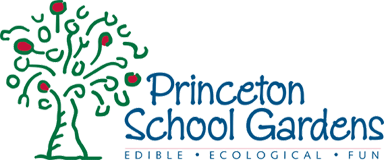
PRINCETON, NJ – A collaboration between Princeton Public Schools (PPS) and Princeton School Gardens Cooperative (501c3) has produced a pilot program to optimize untapped campus resources for illustrating and amplifying curriculum.
The one-year pilot began on Monday, April 17, with PPS welcoming the program’s coordinator, Tomia MacQueen.
Mrs. MacQueen, a longtime educator and master gardener specializing in edible gardens, is the founder of Gardening for Life (Love, Inspiration, Faith, and Empowerment) and Wildflower Farm in Pennington. She is on the boards of Friends of Hopewell Valley Open Space and the Northeast Organic Farming Association-NJ (NOFA-NJ) and is a member of Governance for the Ujamaa Cooperative Farming Alliance, where she is co-lead for the Value-Added Working Group. She holds degrees in dance and education, fine and performing arts, along with a minor in Spanish.
In her role as coordinator, Mrs. MacQueen will work behind the scenes, engaging faculty, staff, facilities, and administration in using interacting school food, water (fall and flow), and land systems on PPS campuses as hands-on, five-senses tools to illustrate and amplify curriculum and to nurture the wellbeing of the diverse student body.
The program was delayed by the COVID-19 pandemic since early 2020. It draws upon the goal to build inclusivity and equity as directed by the district’s strategic plan, along with the innovative New Jersey Climate Change Education mandate, the growing body of research that links connection to the natural world with resilience and wellbeing, and, the understanding of food choices and their effects on the lifelong health of people and planet.
First-year priorities include work toward:
- Frugally and simply matching school foods to curriculum, to seasons, to student demographics, to equity, and to the district’s Edible Gardens plantings;
- Restarting and expanding the Garden State on Your Plate farm-to-table program, which brings chefs and farmers into school cafeterias during lunchtime where they serve up samples of locally grown and simply prepared produce;
- Developing and implementing with the community’s water flow experts the capture and conservation of water for irrigation of Edible Gardens and for plantings of native perennials; and,
- Facilitating, alongside the Princeton Environmental Commission and other nonprofits, multiple-layered micro food forest plantings and maintenance that connect Princeton Middle School and Princeton High School via an “emerald necklace” and support biodiversity, pollinators, and habitat creation.
The success of this position, for students, and by extension, for their parents and community members, will result in the development of lifelong skills that foster wellbeing and individual agency, natural systems stewardship, and the associated pleasures of palate, plate, and people.
Plans are to embed this program within the district curriculum to make it sustainable, long-term, and from it, create a free and available modular template for other schools, said Dr. Joy Barnes-Johnson, science supervisor for grades 6-12, who will work alongside Mrs. MacQueen on the program.
“Food has myriad roles in our lives, and it connects to nearly every academic subject,” said Dr. Barnes-Johnson, of the program. “Our food system affects and is affected by the environment and biodiversity, the economy, the political system, public health, and personal wellbeing – and joy and robustness. We want to develop this program so that we can connect and strengthen our own district, and then share everything we’ve learned with other districts to connect and strengthen them.”
This pilot program is made possible by the longtime and generous financial support of Church & Dwight Employee Giving Fund; Bent Spoon; Lillipies Bakery; Small World Coffee, Whole Earth Center; Princeton Garden Club; Terra Momo Restaurant Group, McCaffrey’s Supermarkets; Ace Hardware; Princeton University; Mrs. G Appliances; the Robert Wood Johnson Foundation; the Ryland Inn in Whitehouse, NJ; Zone Seven, Fenwick Hospitality Group; the faculty, staff, facilities department and administration of Princeton Public Schools; farmers, restaurateurs and artisan producers; and every parent and community member who, since 2005, has scooped soup for Garden State on Your Plate – the Farm to Table program – in the school cafeterias; lugged tools and garden gloves to build and tend Edible Gardens at each of the district’s six campuses; and ensured safety-first skills in the PPS Teaching Kitchens.
